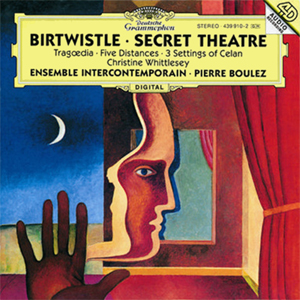Notes from the 2013 Salzburg Festival ( 4 )
Salzburg Contemporary • Klangforum Wien 1
Salzburg Contemporary • Klangforum Wien 1 (Birtwistle)
"Trading Places" and Other Deadly Compositions
Click on excerpt for whole picture. All pictures courtesy Salzburg Festival, © Silvia Lelli
The Salzburg Festival may have done away with the “Kontinent” series that successfully focused on one contemporary composer every year, but under “Salzburg Contemporary” (the title in English, which is of course modern and terribly cosmopolitan!) the concept lives on, diluted. That’s most welcome, even if some of the enthusiasm and faith in the modern works seems missing, as does a bit of the audience for it.
It was certainly excellent to have the opportunity to follow up on the more-difficult-than-expected Gawain with two back-to-back Birtwistle concerts in the Kollegien Kirche, the gorgeous baroque University Church that J.B. Fischer von Erlach built and which is a more prominent presence in town than the tucked-away cathedral. The first night (early music arrangements and early music inspired works by Birtwistle) I missed, due to excellent Mahler. But the second night—which focused on Birtwistle’s seemingly favorite topic: death—I caught.
  H.Birtwistle, Secret Theatre, 3 Settings of Celan, et al., P.Boulez / Ensemble InterContemporain C.Whittlesey DG     |
Cortège (2007), as the title would suggest, might have funereal overtones, but it’s really a lively game of musical chairs during which each the ten mobile musicians (of 14), arranged in a semi-circle, get up to play a solo part in the middle, are ousted by the next instrument, sitting across from them, and move over to the other side. The spotlight-exchange is always a little different: the French horn, for example, which sounded gorgeously direction-less in the acoustic of the University Church, is very gently eased out of its solo by the courteous oboe. The bassoon on the other hand rather rudely snarls at the violin to let her know the time in the limelight is up. The clarinet only gets pushed out by the bass trumpet after vigorous resistance: All rather entertaining music, easy on the ears and filled with action. In the end the flute calls on each instrument to get a last little word in (which reminded me of a Stockhausen trick in SAMSTAG aus LICHT). Then it sighs for a repetitive last few bars before it dies away.
9 Settings of Celan for soprano, two clarinets, viola, cello, and double bass (1989-96), is a song cycle that moves from bittersweet, gentle darkness in “Thread Suns” and “White and Light” to increasingly agitated, torn, dissonant, and angular states with “Psalm” or the yearning “With Letter and Clock”, “One Eye, Open” and “Todtnauberg”. The latter uses the English translation (elsewhere used instead of the German) for spoken text and the German for the parts that are sung, which formed a dialogue for soprano Claron McFadden with herself. Her parts in these songs—continued with the commanding “Tenebrae”, the plain long-and-longer “Night”, and the concluding shimmering-crepuscular “Give the Word”—reinforced the impression, gained in Gawain, the Birtwistle instinctively treats female voices kinder than male voices. Appropriate for Celan, Birtwistle drains color from these songs, with ashen gray remaining, and a final, accusatory exclamation of the soloist.
Der stille Aussatz löst sich dir vom Gaumen
und fächelt Deiner Zunge Licht zu,
Licht
Tombeau, a Stravinsky remembrance of Birtwistle’s (1971), was easier listening. The music was played from the organ loft, at Birtwistle who quietly sat on stage to receive it. It has an entrancing pulse and seems to evoke older composers—well before Stravinsky, too—without quoting them… and then it’s over before it started. As a big fan of brevity (in the work of others, not my own), that was a clear winner. Although… Secret Theatre for chamber ensemble (1984) had a lot going for it, too. The groovy double bass brought by-now-unexpected liveliness to the concert, and the impression was something like that of a minor big band crashing into the Birtwistle concert in the Kollegienkirche, and spilling its members onto stage out of the back of a camper bus... only to then slowly adapt to the music that had been on offer so far. Eventually it becomes all very lively again, as the piece whips itself into a frenzy up to a point of exhaustion… and then ends in a repeated two note figure on the viola that tick-tocks away with a hidden message of “What the world needs now (is love, sweet love)”. Maybe he’s not such a dour cat, after all, that Birtwistle.

























































